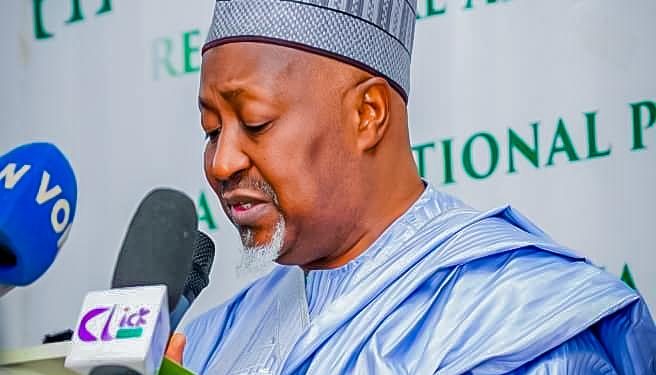*Says Nigeria winning war against insurgency, violent crimes
The Minister of Defence, Mohammad Badaru Abubakar, in applauding the Nigerian Military for exhibiting giant strides against terrorism and violent crimes disclosed that between May 2023 and February 2025, the Military neutralized 13,543 terrorists/criminals,l.
He also said that the nation’s troops arrested 17,469 and rescued 9,821 hostages.
He also disclosed that during the period, 124,408 Boko Haram/ISWAP terrorist combatant fighters and their families surrendered.
He spoke at the 2025 Ministerial Press Briefing held at the Radio House, Abuja, Wednesday, adding that the successes attained via the Military’s renewed synergy includes the recovery of 11,118 weapons and 252,596 assorted ammunitions, from various criminal elements across the country.
“As attested by the President, HE Bola Ahmed Tinubu GCFR, during Nigeria’s 64th Independence Broadcast, over 300 Boko Haram and bandit commanders have been eliminated,” he stressed.
He gave the names of some of the notorious key extremists/terrorist leaders eliminated to include:Damina Hannungiwa Bindin, Kachalla Halilu Sabubu, Ali Kawaje Madada, Yallo Nagoshi Madada, Mai Kusa Katsina, Kachalla Dogo Gudale, Sani Dangote and Haruna Isya Boderi.
Others include: Buharin Yadi, Munzir Arika – (BHT), Ameer Modu – (BHT), Bakura Arina Chiki – (BHT), Kachalla Nagala Jabbi, Kachalla Sani Black, Kachalla Balejo, Kachalla Uban Gida, Lamo Saude, Abu Bilal Manuki, Alhaji Baldu Madaci, Kachalla Idi (Namaidaro), Gambo Kawaje Madada, Kachalla Kabiru (Doka) and Maza Barume Madaro.
The Minister also listed Kachalla Alhaji Dayi, Sani Wala Burki, Kachalla Dogo Kwadd, Chairman Hanazuwa, Kachalla Bandiyo, Odumegu, Maiyara Madaci, Alhaji Karki, Kachalla Makore, Zakiru and Kachalla Azarailu.
He reiterated that “over the past 2 years, our ministry has made significant strides in enhancing national security, modernizing our defence capabilities and promoting regional and international cooperation”.
Badaru emphasised that as Africa’s most populous nation and largest economy, government realises that Nigeria’s stability is pivotal for West Africa and the continent at large.
He added that aware of the problems, which he stressed has global dimension, “the proliferation of transnational threats such as terrorism, cybercrime, and organized crime has necessitated enhanced international cooperation”.
He explained that the problems which affected the Sahel region, in particular, has therefore made the region “a hotspot for Jihadist activities, with groups exploiting local grievances and state weaknesses”.
He added that, “the instability in the Sahel has direct implications for Nigeria, especially in its northern regions.
“The Sahel, stretching across Africa south of the Sahara, faces escalating violence from armed Islamist groups”.
He said “the formation of the Alliance of Sahel States by Mali, Burkina Faso, and Niger, following their exit from ECOWAS, signifies a shift in regional security dynamics”, adding that, “analysts express concerns that these moves may further destabilize the region”.
To ameliorate the problems, he said, “Nigeria has had to respond strategically, balancing regional diplomacy with reinforced border security.
“Notably, we have maintained Nigeria’s commitment to multilateral platforms while recalibrating our regional defence posture to address new alliances such as the Alliance of Sahel States”.
In spite of efforts to ameliorate the problems, the Minister noted that the Lake Chad Basin, encompassing parts of Nigeria, Niger, Chad, and Cameroon, remains a focal point of insecurity.
“Despite efforts by the Multinational Joint Task Force (MNJTF), Boko Haram and its splinter group, the Islamic State West Africa Province (ISWAP), continue to pose significant threats.
“Over the past 2 years, however, our intensified operations in the northeast, particularly through collaboration within the Multinational Joint Task Force (MNJTF), have significantly weakened Boko Haram and ISWAP strongholds.
“Several high-value targets have been neutralized, and dozens of captured territories have been reclaimed.
“In collaboration with our international partners, we have also enhanced intelligence sharing and deployed advanced surveillance technology in the Lake Chad region, improving our cross-border response capabilities,” he said.
He noted, however, that internally, Nigeria grapples with multiple security crises.
“In the northeast, the Boko Haram and ISWAP have continued to carry out isolated and desperate attacks, including the use of armed drones.
“The Northwest also faces banditry and kidnapping, while the North-central region experiences ethnic related and farmer-herder conflicts, exacerbated by climate change and resource competition.
“President Bola Tinubu’s administration, elected in 2023 with promises to enhance security, has been making determined efforts to fulfill this promise,” he stated.
He blamed decades-long socio-political fractures, economic dislocations, porous transnational borders, foreign insurgent influences and a global terrorism matrix that continues to mutate beyond classical military doctrines, as contributory factors to the problems in Nigeria.
He explained that “President Tinubu’s firm directive, “Enough is enough,” signals reinforcement of political will, which also spurs us to double our efforts in conjunction with all stakeholders towards overcoming the security challenges.
“Thus, under the leadership and direction of the president, the Ministry of Defence has coordinated joint efforts through intelligence sharing, coordinated various kinetic and non-kinetic efforts to defeat insecurity.
“In pursuance of the ministerial deliverables, the Ministry has achieved many feats which show a leap in the right direction,”.
He stressed that to defeat insurgency, Nigeria requires “not just bullets and bombs, but winning hearts and minds, stabilizing local economies, deradicalizing ideologies, and rebuilding governance structures all of which can best be achieved through whole of nation approach”.
He added that “a notorious gun runner and bandit, Na Faranshi, famous for supplying weapons from Mali and Niger to criminal groups in Nigeria’s Northwest was also eliminated in February 2025.
“Within April this year, Joint Military Operations eliminated Bandit Kingpin Gwaska, alongside over 100 foot soldiers in Katsina.
“Also, a bandit kingpin, Bello Kaura, who succeeded the late Halilu Sububu, was neutralised alongside Sububu’s brother Mati and an unspecified number of bandits on 9 April 2025.
“Maigemu, a Lakurawa kingpin, was also eliminated in Arewa LGA of Kebbi State, while bandit leader “Yellow Aboki” was eliminated in Tsafe LGA of Zamfara State within the First Quarter of 2025,” he said.









